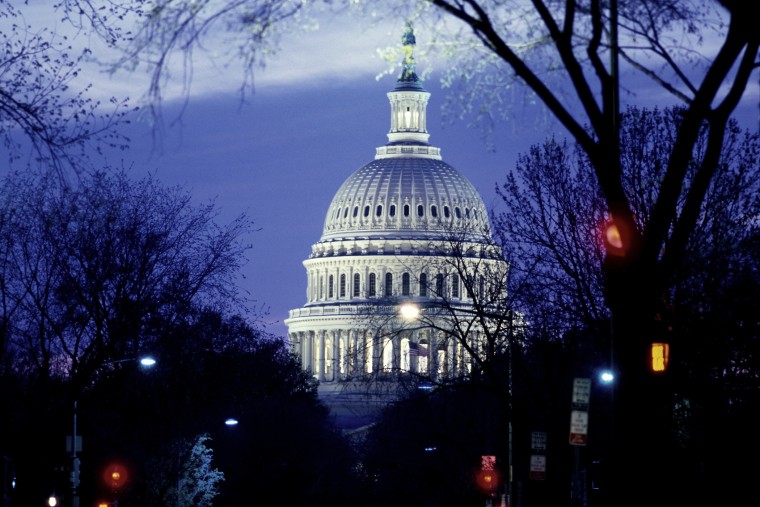Over the last month, President Obama has launched over 100 airstrikes on ISIS targets in Iraq, while at the same time, Obama's diplomatic and national security team continues to gather support from international partners on confronting ISIS threats in the Middle East.
In response, hysterical congressional Republicans are demanding to know why the White House isn't doing anything about ISIS.
If President Obama won't act to defeat ISIS, House Majority Leader Kevin McCarthy (R-Calif.) says, Congress might move to force his hand. [...] "I am of support of going in and not sitting back, but creating a strategy of where we go," McCarthy said in a radio interview with guest host Rep. John Campbell (R-Calif.) on the "Hugh Hewitt Show." "And if the president won't act, I think we have to take some action to move forward."
If you ever feel like national security debates unfold on Capitol Hill like they were scripted by Lewis Carroll, you're not alone.
In this case, what would it look like if House Republicans "take some action"? No one's entirely sure, but it appears that McCarthy's plan is to have the Obama administration tell Republicans about its plan. It's what passes as "action" in the GOP-led House.
Pointless posturing aside, we seem to have reached the point at which there are two parallel debates underway on Capitol Hill. The first is whether broader U.S. military intervention is wise; the second is what, if anything, Congress intends to do about authorizing such intervention.
On the former, there's no shortage of Republican hawks, eager for more war. Sen. Ted Cruz (R-Texas) said over the weekend, "We ought to bomb them back to the stone age." It's an extension of Bill Kristol's suggestion that the White House begin a new bombing phase in the conflict and "see what happens."
There are, however, still some grown-ups in Washington, including Rep. Adam Schiff (D-Calif.), a senior member on the House Intelligence Committee, who's patiently trying to explain why military intervention in Syria may be effective.
As for the question about legislative remedies, we've taken a keen interest in the subject -- I assume readers have seen our ongoing Whip Count -- and there's been a fair amount of movement on the issue this week.
In case it's not obvious, this matters a great deal. Let's say, hypothetically, that members of Congress agree that a debate on authorizing force is worthwhile. And let's also say, just for the sake of conversation, that Rep. Adam Smith (D-Wash.) is wrong and both chambers are willing to write a resolution and bring it to the floor. At that point, the key question -- or, at least one of them -- becomes what in the world members actually intend to vote on.
Sen. Bill Nelson (D-Fla.) announced this week that he will introduce a resolution giving Obama legal authority to launch strikes against ISIS targets in Syria. A separate idea is pending in the House, which is a little more, shall we say, expansive.
Rep. Frank R. Wolf, R-Va., said in a statement Wednesday he will introduce legislation when Congress reconvenes next week that would authorize the use of military force against ISIS and other terror groups around the world, including al Nusra, Ansar al Sharia, al Shabaab and Boko Haram.
If you thought the post-9/11 AUMF resolution was broad, wait until the debate begins on Frank Wolf's new proposal. Jim Newell wrote, "Let's just say that Wolf's is a bit, um, broader than Nelson's. Or to put it another way: Frank Wolf's will codify the president's authority to basically bomb whomever he wants, wherever, and whenever, forever."
That may sound hyperbolic, but I don't think it is. The draft language of the resolution is online (pdf) and it offers the president counter-terrorism powers without geographic limits, without time constraints, and with no meaningful constraints on terrorist targets.
It's effectively a "Battlefield: Earth" policy. Hayes Brown added, in reference to Wolf's resolution, "The rise of militants around the world has got politicians in Congress nervous and looking for a solution, with one House member proposing the U.S. declare war on all of them, infinitely, and with no limitations."
To be sure, it'd be a step in the right direction -- constitutionally speaking -- if lawmakers did their duty, had a debate, and held an actual vote on authorizing the use of force. At this point, there's no guarantee this will happen, and House GOP leaders have said very little about their intentions.
That said, the country is going to have to come to terms with exactly what kind of AUMF is responsible given the circumstances, and just how much power Congress intends to put in the hands of the president.
